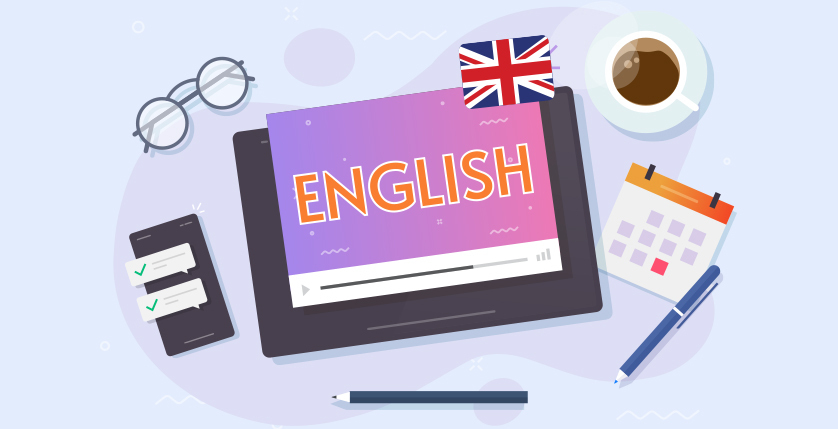A person who is constantly engaged in self-improvement always wants to learn new things. But sometimes there are moments when we look at the book bought to study a foreign language and start to lose the belief we can actually master it. There is always a lack of time and understanding of the efficient way to study. This is the reason we have collected here some recommendations on how to effectively study English.
How to improve your English: effective methods
- 14.03.2024
- Posted by: Admin

But first, let's look at the methods of language learning step-by-step.
Methods for teaching English:
- communicative approach ‒ a methodology designed to teach a language learner to handle communication here and now. When using this method, you usually feel that all the tasks and grammar are based on real-life situations, for example: social English – ordering train tickets, checking in at a hotel, etc;
- lexical methodology ‒ a methodology based on learning vocabulary and phrases that are used most often. There is less attention paid to the grammatical side, as the focus is on memorizing words and phrases;
- grammar translation method ‒ is the one we learned at school. Reading a rule and doing a few exercises to understand and practice it – this is exactly what the Grammar Translation method looks like. Even though it is not as good as in real life, this method is still very popular and widely used;
- audio-lingual method ‒ a method from the 90s, the time when it was popular to listen to recordings and repeat after the speaker while driving to work. This method also doesn't directly use grammar;
- task-based method ‒ as the name suggests, this is the simplest method used in almost all work areas, since it perfectly harmonizes with the work. (For example: learning software vocabulary: passive voice, directions).
How does our brain work? How to learn a language so that you can really master it?
Goals
The first thing to ask yourself is why do you want to learn a language? What exactly do you need? It is very useful to set some goals, even small ones because this way you will be able to see for yourself what level you have reached and what you have learned. It is absolutely normal to describe your goal as: "I want to learn how to order coffee in English" and so on.
Level
Self-aware students are always confident in their abilities and are the best gift for any teacher. Knowing your level is one of the key points in learning languages because it helps you to understand what direction you need to work in. You can check your English level online, or you can also contact language schools that will test you and give you feedback.
Time
Like with anything, you need to allocate time to learning a language. Be prepared to do this regularly. Avoid changing the time of classes and prepare for them in advance. Or, if you study on your own, make sure you don't start studying when you're tired or skip your own classes.
Method
Knowing what works best for you individually is crucial, which is why it's important to determine what type of learner you are.
Practical tips for learning languages.
With the rise of social media and the media industry, there are more and more methods for learning languages, so it's hard to surprise anyone by learning languages through YouTube videos. We have prepared some tips for you on the most common modern methods of learning English.
1. Watching TV shows and movies.
Watching TV shows and movies is one of the most popular ways to learn languages, however, you need to be careful to not accidentally switch to just enjoying the movies instead of studying and practicing.
Teachers recommend watching movies twice and creating your own assignments after watching them:
- For example, according to the communicative approach, after watching an episode of a TV show for the first time, you can try to retell the episode and write down in English the main events that happened.
- Watching an episode for the second time, you can write down a few new words and phrases. By the way, learning whole phrases, or established expressions, is much more beneficial than learning just individual words.
Another important point is to watch your favorite TV show or movie in the original language (English) with or without subtitles.
2. Books, articles, and blogs.
It is good to find materials for your own independent practice no matter if you study with or without a teacher. Due to the lockdown, a lot of educational processes have moved online, so there is a lot of material available on the Internet:
- teachers who share helpful information on learning English, who can be found on Instagram and Facebook;
- language learning platforms and applications: EWA, Duolinguo;
- educational blogs: BBC Learning English, Perfect English Grammar;
- YouTube videos on certain grammar topics: Rachel's English, Learn English with EnglishClass101.com
3. Listening to audio materials.
This is a favorite method of those who prefer listening and is one of the most accessible of all methods. This is because you can find audio lessons or podcasts for literally any level.
Here is a list of the most popular podcasts for learning English:
- British Council ‒ podcasts designed to improve your English listening skills. The language level of the podcasts varies from A2 to B1.
- Podcasts in English ‒ it is a resource with podcasts and tasks for them. Every week, the resource releases a new weekly podcast with relevant topics.
- BBC Podcast is the BBC podcast library where you can find a podcast for any level and topic.
4. Communication with native speakers.
Today, there are a lot of apps and websites that allow you to communicate with native English speakers. They provide a convenient way to talk to native speakers at any time. We have prepared a selection of the best apps for communicating with native speakers.
- Tandem ‒ is a language learning app with user-friendly functionality where you can learn a language together with native speakers. At the same time, it allows users to act as a teacher for people who are interested in learning the user's native language.
- HelloTalk is another app for communicating with native speakers and learning languages. Along with communicating with other users, the app includes a blog and offers classes at different levels.
- Memrise is an application focused on a lexical approach. Students learn everyday words and phrases that are used in real life. The app also has lessons and levels, with video sketches used as tests.
- Interpals is an application where you can find a native English teacher, lesson plans and chat rooms.
They are also becoming popular sites where you can find a native language teacher, after all, what could be more exciting than learning with a teacher from the heart of London? The most popular platforms at the moment are Cambly and Italki.
These days, with the rapid development of language platforms and freely available information, it has become much easier to learn languages than it used to be. In this article, we have shared some useful recommendations for learning English, along with apps, platforms, and methods for effective learning.


